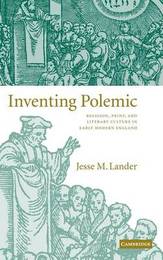
|
Inventing Polemic: Religion, Print, and Literary Culture in Early Modern England
Hardback
Main Details
| Title |
Inventing Polemic: Religion, Print, and Literary Culture in Early Modern England
|
| Authors and Contributors |
By (author) Jesse M. Lander
|
| Physical Properties |
| Format:Hardback | | Pages:336 | | Dimensions(mm): Height 229,Width 152 |
|
| Category/Genre | Literary studies - general
Christianity |
|---|
| ISBN/Barcode |
9780521838542
|
| Classifications | Dewey:239 |
|---|
| Audience | | Professional & Vocational | |
|---|
|
Publishing Details |
| Publisher |
Cambridge University Press
|
| Imprint |
Cambridge University Press
|
| Publication Date |
30 March 2006 |
| Publication Country |
United Kingdom
|
Description
Inventing Polemic examines the ways in which the new technology of print and Reformation polemic together dramatically transformed the literary culture of early modern England. Bringing together recent important work in two distinct areas, the history of the book and the history of religion, it gives an innovative account of the formation of literary culture in Tudor-Stuart England. Each of the central chapters of the book focuses on a specific publishing event: Foxe's Actes and Monuments, the Marprelate pamphlets, the first two quartos of Hamlet, Donne's Pseudo-Martyr and The Anatomy of the World, and Milton's Areopagitica. In a discussion of the Restoration publisher Jacob Tonson and the eighteenth-century literary entrepreneur Samuel Johnson, Lander also considers the way in which subsequent understandings of literature and the literary were shaped by a conscious and conspicuous rejection of polemic. This study is an important contribution to the history of the book.
Author Biography
Jesse M. Lander is Assistant Professor of English at the University of Notre Dame. His research interests include Renaissance Drama, the Reformation, and Shakespeare Studies.
Reviews'Lander's study is important for its sobering argument that 'the literary culture of early modern England was fractious, robust, and deeply polemical ...' SEL: Studies in English Literature '... there is a real contribution to several debates here, and this study opens up an illuminating perspective on some key aspects of the period.' The Glass
|